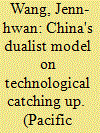| Srl | Item |
| 1 |
ID:
074432


|
|
|
|
|
| Publication |
2006.
|
| Summary/Abstract |
The central question of this paper is whether China can go beyond simple technological transfer and toward innovation in this age of globalization. By adopting an institutionalist perspective, this paper argues that China has developed a dualist model during its economic transitional period in which the foreign sector has been isolated from domestic firms, while the domestic industrial sectors have also failed to develop organic linkages among themselves to facilitate technological learning and generate innovation. This paper discusses four major institutional arrangements that deeply influence China's technological development - the institutional logic of economic reform, the state's industrial policy, the financial system and the industrial structure. It suggests that, owing to these institutional elements, China has neither developed economies of scale, as compared with the South Korean case, nor has it built up a network-type of economy similar to its Taiwanese counterpart in order to generate the mechanisms needed for technological innovation.
|
|
|
|
|
|
|
|
|
|
|
|
|
|
|
|
| 2 |
ID:
123960


|
|
|
|
|
| Publication |
2013.
|
| Summary/Abstract |
The purpose of this paper is to look into the transformation of local innovation systems in the high-tech parks of Shanghai and Beijing and their technological learning and upgrading. The areas that we have chosen to investigate are Beijing's Zhongguancun and Shanghai's Yangpu District. The main reason that we selected these two areas for study is because they are home to most of the top universities and R&D institutes in these two cities. Our main focus will be on how institutions-the local state, inter-firm relations and the relationship between R&D institutions and firms-are co-evolving to shape and constrain a local system of innovation. Our research finds that the capacities and autonomy of the Zhongguancun of Beijing's Haidian District and Yangpu District of Shanghai differ in various aspects, but both regions are struggling to upgrade innovation and enhance economic development. The 'high-tech cluster' provides a useful instrument or label to achieve goals other than innovation and R&D. Elite universities are regarded as engines for network formation, but visible and invisible walls of Chinese universities discount efforts to foster a university-centered innovation hub which especially shows in the Yangpu case.
|
|
|
|
|
|
|
|
|
|
|
|
|
|
|
|